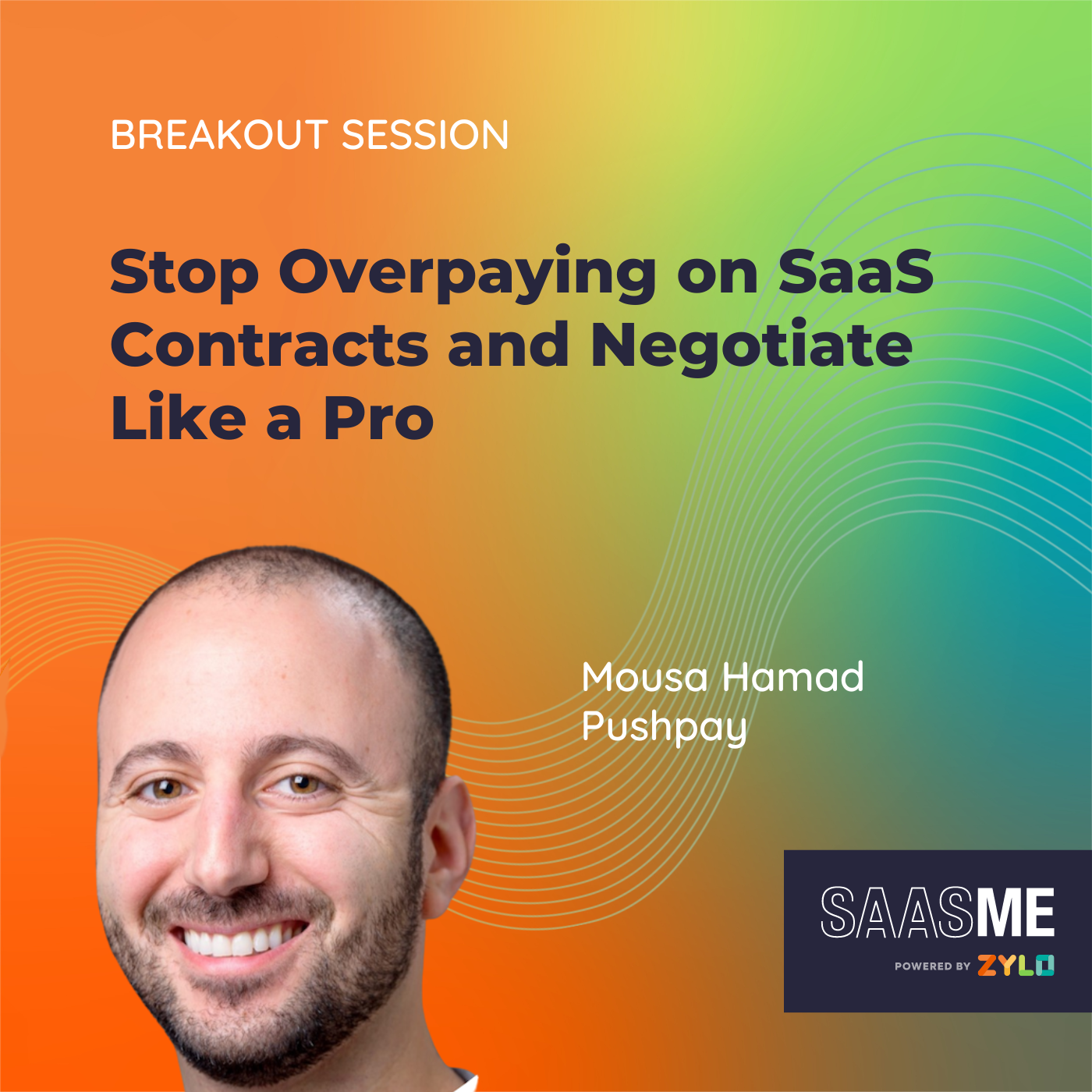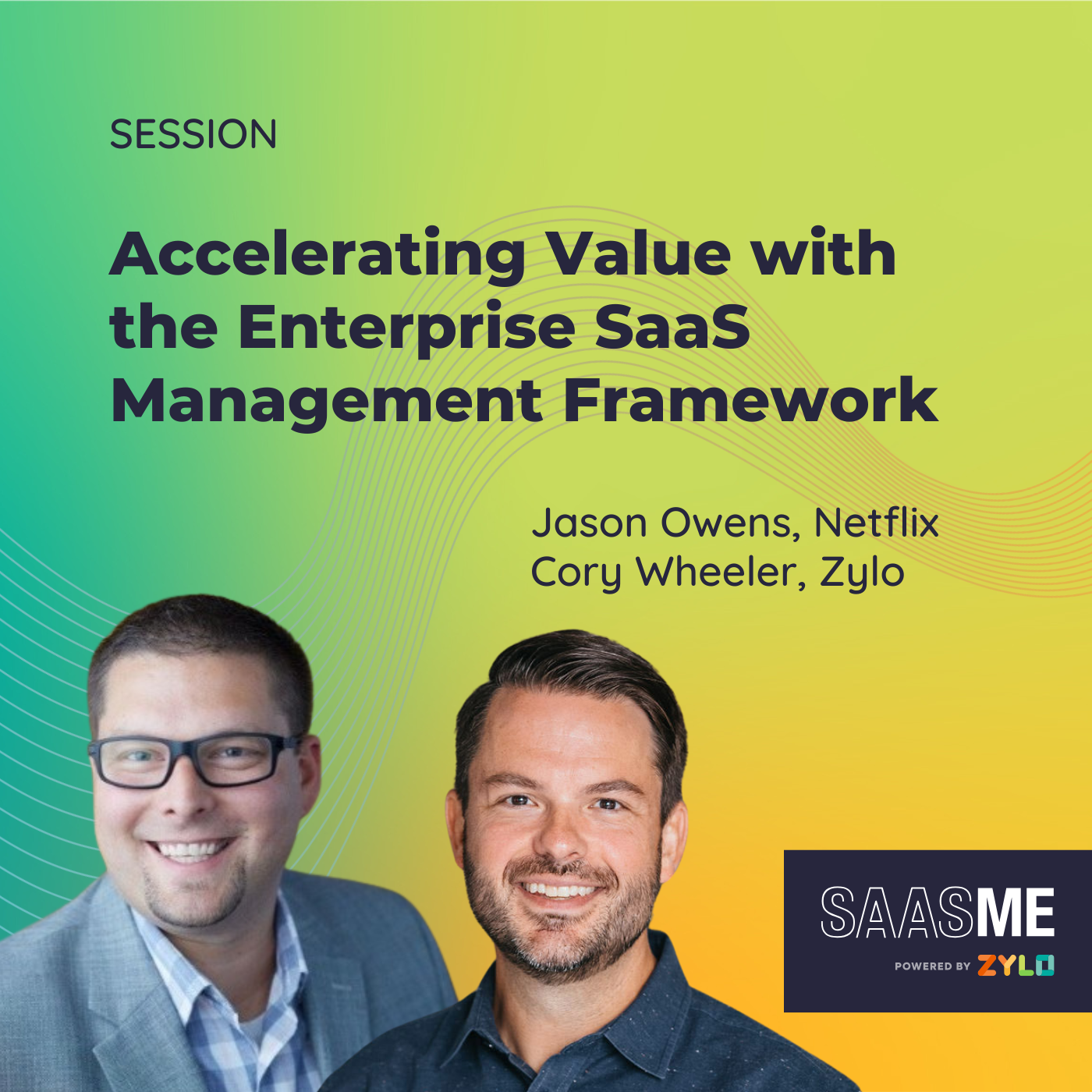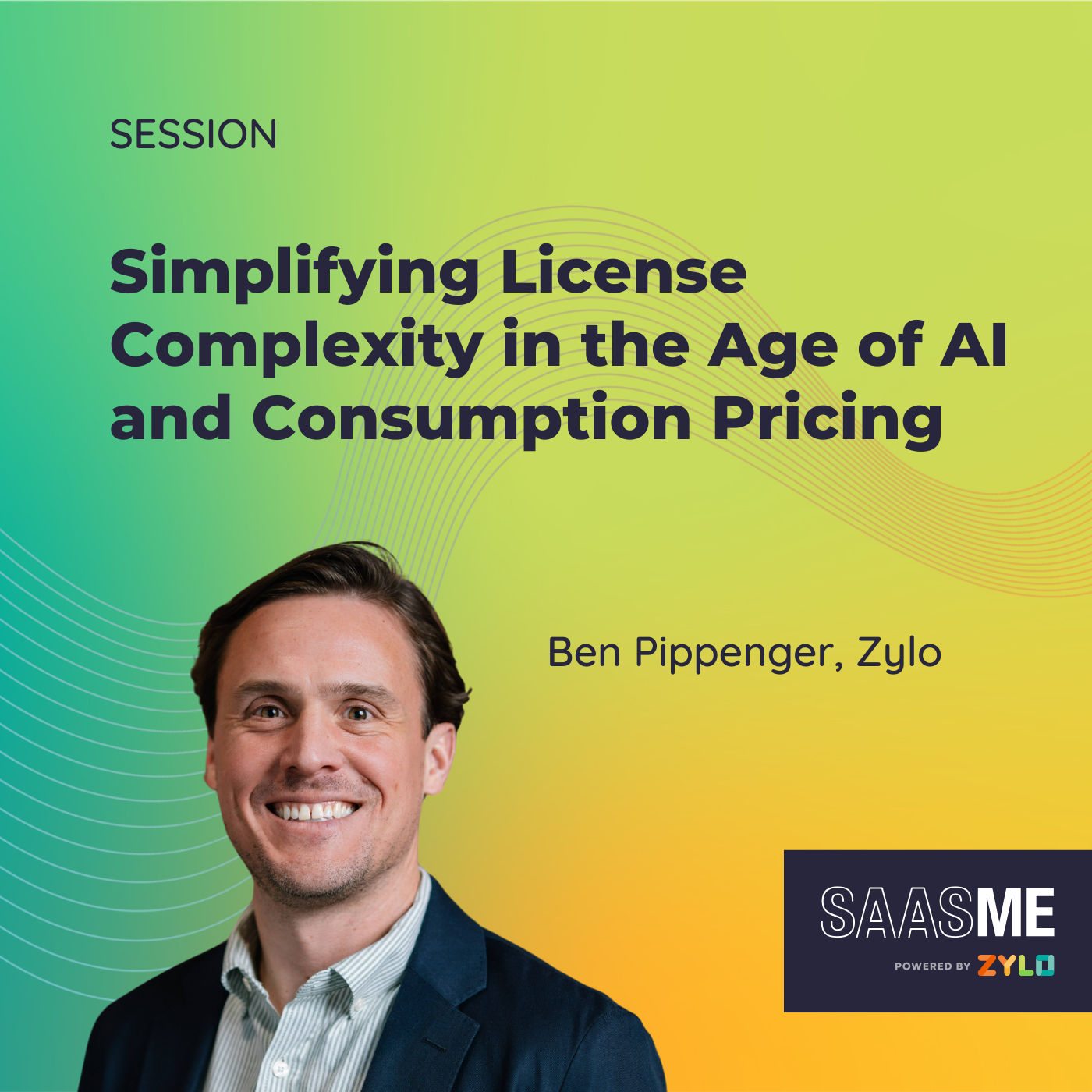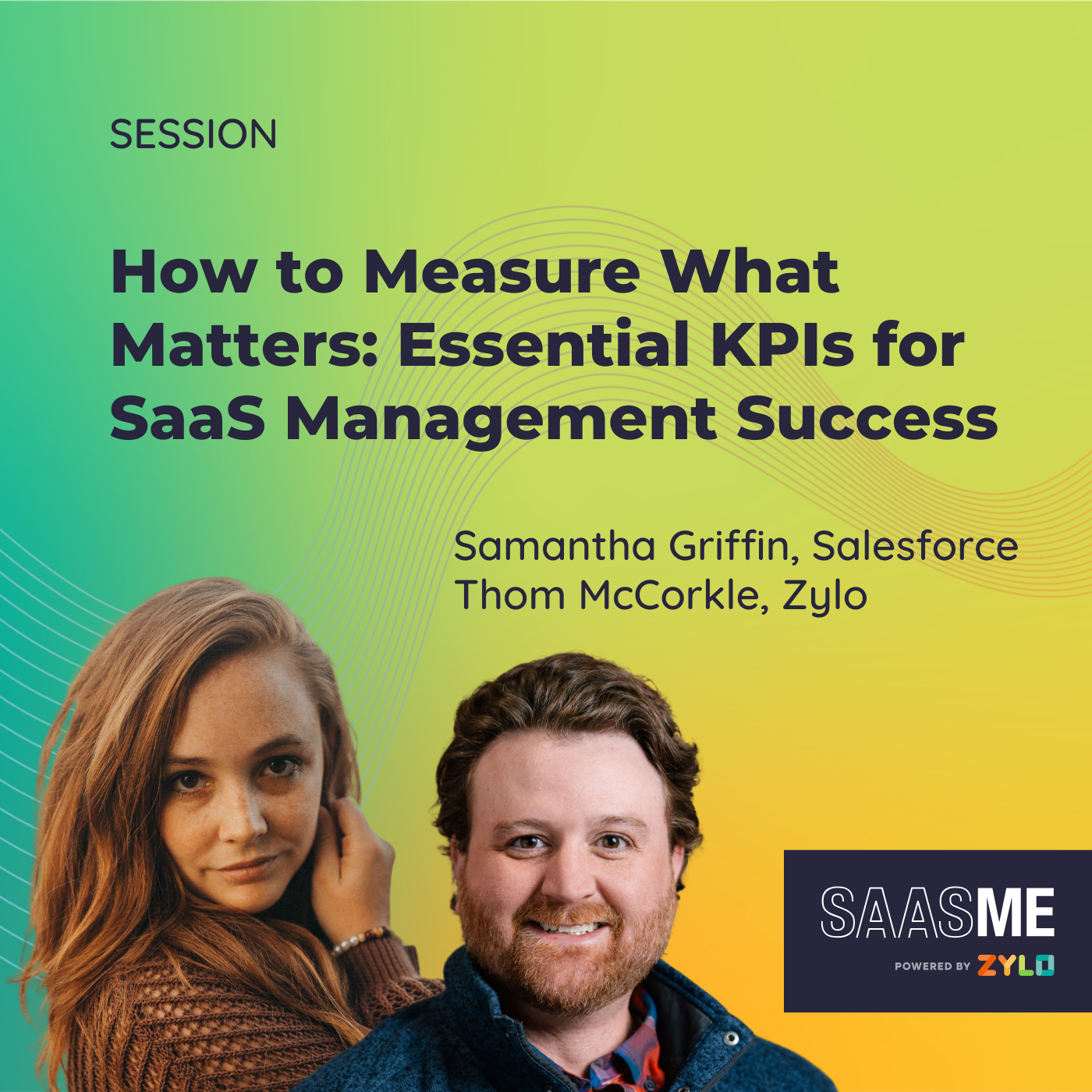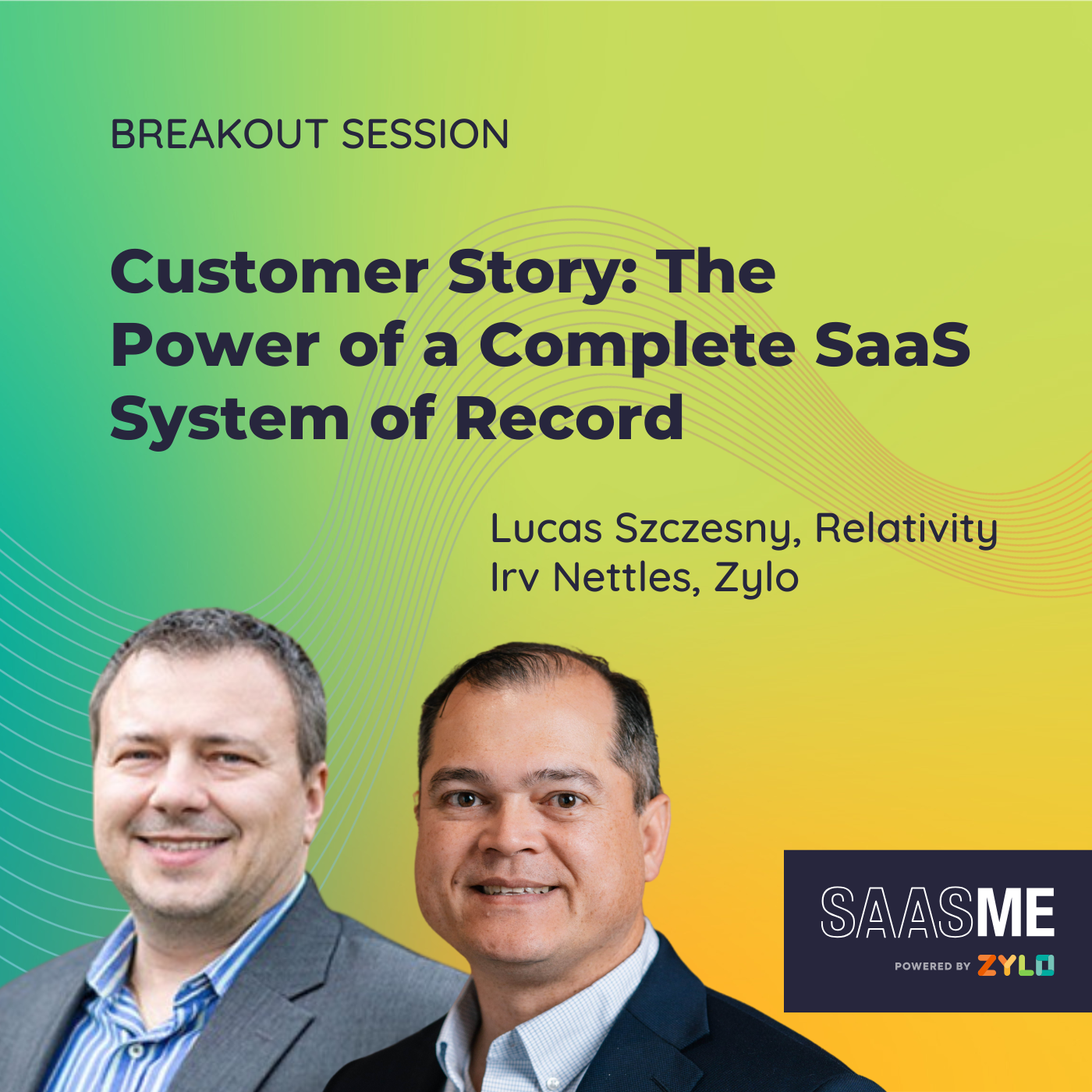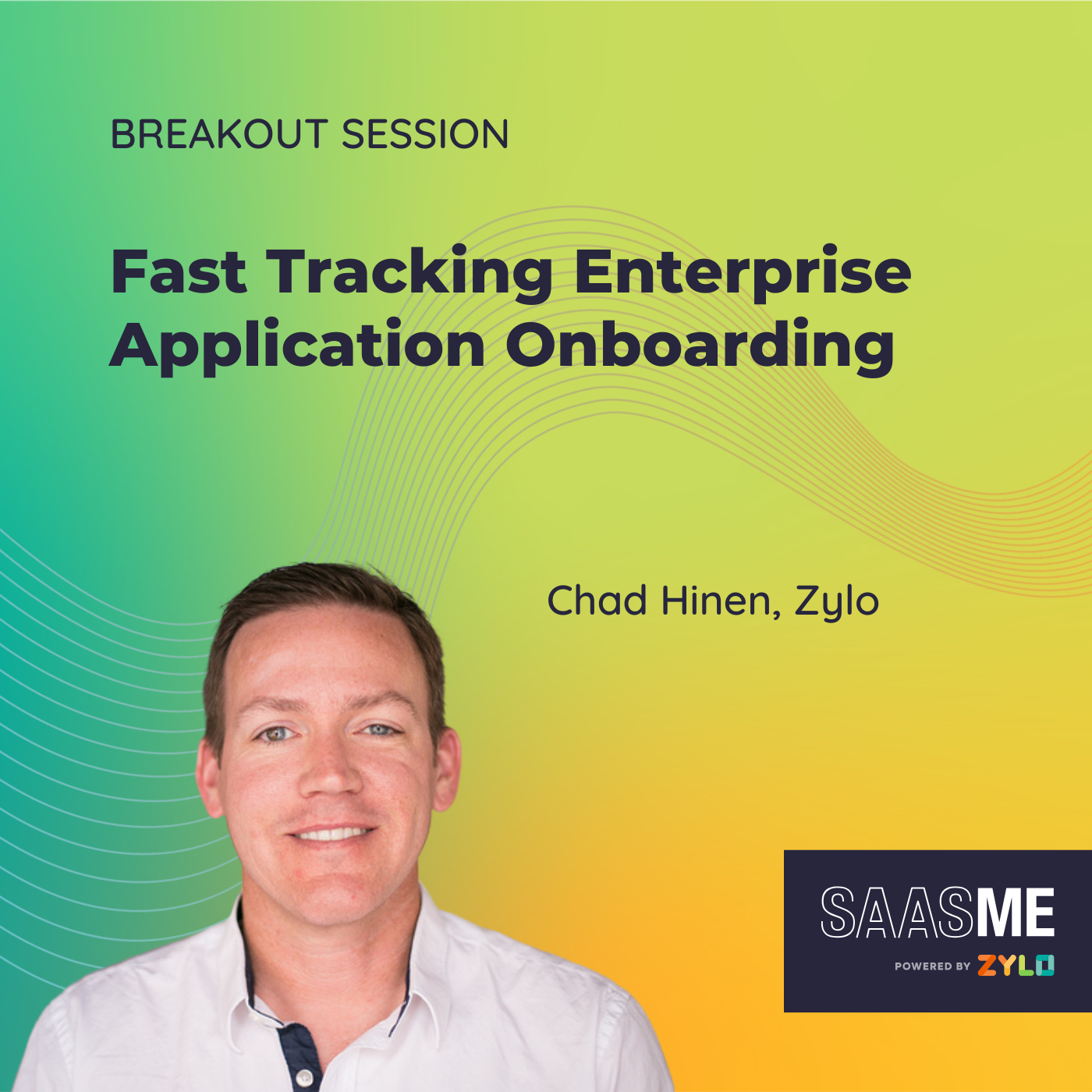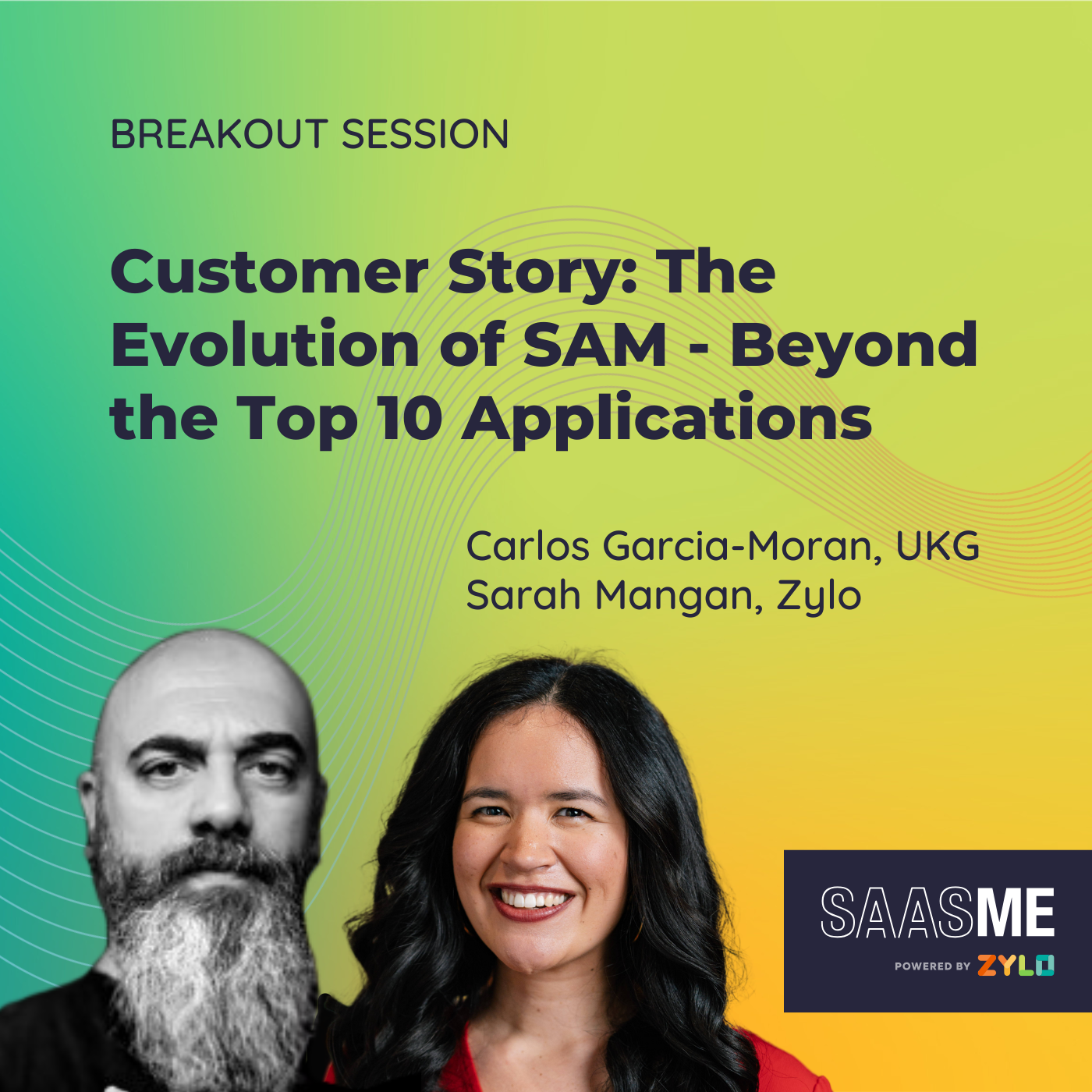Stop Overpaying on SaaS Contracts and Negotiate Like a Pro
- 0.5
- 1
- 1.25
- 1.5
- 1.75
- 2
Mousa Hamad: Thanks everybody for taking time out of what are no doubt your busy days to be here to hear me speak on the art of negotiation and not overpaying for SaaS. None of this is going to be a silver bullet or anything that's going to magically solve your problem. Some of it involves a lot of hard work, but I think if you give it a listen and keep an open mind, hopefully you'll take a couple of tips. I'm excited to gain insights and tips and hear questions too throughout in the chat. Please feel free to do that. We'll try to keep up with them or just aggregate them, depending on how I go.
Mousa Hamad: But yeah, so just diving in, introducing myself. My name is Mousa Hamad. I'm the Vice President of Corporate IT and Procurement at Pushpay. Pushpay is a software donor engagement platform, typically centered around the faith sector, and has been in existence for over 10 years. Started down in Auckland, New Zealand and has a lot of activity and employees in the United States today.
Mousa Hamad: So, I've been in tech for 15 years. I started as a tier one tech, just fixing printers and replacing RAM and motherboards. Really fell into it and fell in love with it, and throughout my years of not having any tech background, I tell people when they ask, how'd you get to the point where you got? I was all about the customer service aspect of it, and I still till today enjoy that, and I think there's an element of that that will show through in what we talk about with negotiation tactics.
Mousa Hamad: I am a father. That's my five year old daughter, Milaia. I do reside on the Gulf Coast of Florida, so currently in the present track of Hurricane Ian here in the next 24 hours. When we're not having a torrential storm bearing down on us, I do enjoy riding my bike around the waterfront, Punta Gorda where I live, play basketball out there as well and do some paddle boarding. So that's a little bit about me, just because it's not all work obviously.
Mousa Hamad: Shout out to Tallahassee. Saw that in the chat there.
Mousa Hamad: So in looking at the agenda, kind of some of the things, we're going to talk about building the foundation around how you get to the point to be armed to be a good negotiator. I'll talk specifically about some of the real world experiences that I went through and some of the things that I did to kind of help facilitate that. What those impacts were directly on negotiation and the benefits of the fruits of your labor of spending the countless hours combing through file shares and email addresses and emails looking for contracts.
Mousa Hamad: As we move on a little bit here, I joke, a long time ago in a startup far away, because I'm a nerd. Whatever. But it's not necessarily just a startup far away. As I say that, it also is true of companies that have been in existence for 50, 60 years because, while their processes and everything have been up and going for that long, the idea of purchasing SaaS is a relatively new phenomena. And companies, old, young, big, and small, I think seem to find that there's a pain point with it and also find that when they get to a really good place with it, they're in a much better situation.
Mousa Hamad: I think to become an effective negotiator, you have to fully understand your landscape, and we'll talk a little bit about what that looks like. If you feel a little overwhelmed by your SaaS and you don't know that you have a full handle on what you have, odds are you've been like me in a past life where you're slacking with the stakeholder of a software that you're going into a negotiation to renew, and it's a significant five or six figure deal, and you're kind of catching information on the fly going in. It doesn't matter how good you are at negotiating. You're never going to lead out with the best foot, you're never going to be in the best possible situation if you're coming into a negotiation like that.
Mousa Hamad: So talking about what I've done at both early mid stage startup type companies or even large long established publicly traded companies, it was really a three pronged attack to get to the point where we were effective at negotiating as an entity.
Mousa Hamad: The first is the discovery, and that literally starts with, I'll reference back to the 2019 panel I did with Ryan about Zylo at Oktane. And it was actually, I think Adrian that said it, but it was follow the money. If you know where you're spending money, then you know what software you're buying. And so literally did a line by line scan of that, searching contracts and folders and then Slack and then emails and all of that stuff.
Mousa Hamad: And then talking to multiple departments who would have a best invested interest at one time or another of aggregating contracts as well, because odds are they have good repositories, and what you'll probably find is that there are multiple repositories for contracts in your company. And as we all agree, if multiple people are doing something, odds are nobody's doing it fully. Getting into the process a little bit was big on collaboration communication methods.
Mousa Hamad: Using Slack threads, creating Slack channels to track renewals so that all the different stakeholders and folks that need input are there. Which tools are you going to use? Obviously, years ago when I first endeavored on SaaS management, I selected Zylo. I'm here speaking on it today because I'm a big believer in it. I've used Asana and Smartsheet and other project management tools, and Atlassian suite to track the progress of renewals, as well as information about that renewal. And then it really goes to establishing a culture, communication and tracking, celebrating wins, and getting everybody invested. And where that comes in on the negotiation piece is if you have partners within the business and you're able to have them ride alongside you, or you're able to ride alongside them effectively in a contract renewal or a new tool contract discussion, you're going to be that much more effective at coming at the, I don't know, the opposing party, the other side, whatever you want to call them, in terms of the conversation and the perspectives that you can bring.
Mousa Hamad: So after you do all that hard work, my anecdotal story is that my SaaS journey started in December of 2017, 2 months after my now five year old was born. And it was sitting there with a big monitor on my kitchen table, combing through files and emails and everything that I could to find contracts. That was not a happy place. But eventually, if you do it right and you get everybody involved, you do get a happy place where you have all your contracts in one place and you're out ahead of renewals and doing all that good stuff.
Mousa Hamad: All of these things that feed the happy place are going to feed a lot of the levers around negotiation that we'll talk about on the next slide, which is really kind of the meat of what we're trying to get at. But the less duplication of tools you have across the business that do redundant functions, the more licensing you'll buy from a single vendor, better economies of scale.
Mousa Hamad: More time allows you to sanity check the market. I mean, one of the things, I'm not going to sit here and say that I sit and read LinkedIn and just search for new SaaS tools all day, but one of the values that I feel like we add to our business, where they view us, not only as good negotiators, but we can also be good advisors. And being a good advisor and creating options for your purchaser, as the person in the seat of procurement, allows you to be a more effective negotiator because you can take three really good top tier vendor choices in a vertical and effectively put them against each other, because they're all going to want to earn that new label.
Mousa Hamad: And so there is value in having those relationships and having that knowledge of the SaaS space, as it relates to doing your procurement function.Being viewed as a partner, again goes back to that same thing, or having an open Slack channel where folks can just ask about software ideas, puts you out ahead of any purchasing trends that the business may have. And that again, just puts you in a better position to be successful.
Mousa Hamad: And then being transparent both internally and internally, and we'll talk more about that in a little bit also. So kind of come in here, and this is kind of the levers you can pull probably, the big meat of it and where I'm going to hang out the most. Early action puts you in a driver's seat.
Mousa Hamad: So currently working on KPIs internally for us where we want to be out 90 days ahead of the notification period, this is one of those things where sometimes it goes unsaid and it's typically not anything that you have to worry about where I've ever seen a vendor be punitive. But let's be real. Part of this for me when I go into a negotiation is I've got an account executive on the other side who's trying to achieve the same outcome I am, which is to get the best possible deal for everybody involved so that we can all walk away happy. And I kind of view some of these hygienic things that we talk about where you're out ahead of the renewal period as not a way to frame it of being punitive and saying," Hey, we're going to leave." It's," Hey, look. We're happy with your tool, but we can't have you beat us over the head.
Mousa Hamad: Here you go, salesperson X that I'm working with. One of the levers that I'm going to allow you to pull with your management and your deal desk in the process is that I've come to you early to open up the possibility of an open bin, so that you can help me keep the cost out." So even when you're doing this and coming at it, you can still look at it as a partnership with the AE and be upfront about it. Hey, we're trying to establish that we can't have our costs go up very high on this. We're trying to empower ourselves to be in a position to make the best decision. And we think that by being transparent with you about this, it'll empower you to give us the best deal and everybody can walk away happy. I've never played this punitively or in a mean way. I think I have this later in my notes, but I'll say it now. I always come into these transparent and with as much kindness as I absolutely can. And the reason for that, and some advice that I got many years ago but took me way too long to listen to it probably, is that it's a lot easier to walk back being nice than it is to walk back being an asshole. And so for me, this isn't about one upping anyone or doing anything, it's," Hey, this is what we do internally, and this is how it informs the way we negotiate, and this is what we expect from our partners in response to that."
Mousa Hamad: So having a really strong KPI around letting your business know early on that a renewal's coming up starts the conversation and allows you to be transparent and leverage that. Yeah, thank you Tim. I appreciate that. You got to kind of frame it in a way where it's not an us versus them type of deal. So yeah, so early action puts you in the driver's seat. This'll be one that is so obvious but still one that's worth touching on. How many of you all, show of hands, whatever you want to do. Ah, here's a poll. How many project management tools are in your business today? One, two to four, or five or more, or whatever. Megan, you can pick a better breakdown that works. I guarantee you that the answer is not going to be one for anybody, unless they're like a 10 person company. And so that is what we had, the effect that I've had at a couple different places. Three, used to be seven. Yeah, see Ryan put in that work.
Mousa Hamad: What I've had at every place I've ever been is multiple project management tools, and every single one of them is being paid for via credit card through the main site with just standard five, 10% discount, whatever, for paying annually up front, or just having a recurring payment set up or whatever. But as an example, if you're able to, now this is where it's a unique spot for us, for myself sitting in IT where we can really help guide that discussion.
Mousa Hamad: But I'm a believer now that procurement departments have a larger voice at the table, and have an opportunity to make these feelings heard and known. But from our IT seat, we're able to kind of influence when we see that there's an opportunity to get somebody off of a less utilized tool. And for us as an example, let's say we move them to like Wrike or Smartsheet, it's a win. And then eventually we get to the point where we can then go to that vendor, or they even come to us, excuse me, and say," Hey, you've got a lot of seats. Why don't we talk about an enterprise solution?" Yada, ya. So I found that this is most effective with PM tools, and then it seems to be also something that kind of can plague marketing from time to time a little bit with other tools in their vertical also. But this is long tail. If Ryan were able to join the virtual stage with me and I asked him," Dude, how long did it take you to get from seven to three?" I guarantee you he's not going to say six months or eight months. He probably put in quite a bit of work to get there. And so these are the types of things that you have to be thinking about as part of a long- term vision and not something that you're going to come in and get a quick win over, because, A, it takes time to transition people to different tools, but, B, and more important to the conversation, is that it takes time to build that trust with people to get to the point where they'll hear you on leaving the tool.
Mousa Hamad: Understanding that the nature of the relationship, this is where we're currently working at Pushpay is a part of our maturation. We have a director of procurement who is leveraging Zylo for this, but we're effectively wanting to track the temperature of the relationship, much in the same way that I think a lot of customer success functions have a churn monitor, heart monitor tool for their customers. We effectively want to do the same within procurement, because let me tell you right now, if you've been lacking in your support, I got excited just now. It's like the most energy I've had in a while. If you don't have top tier support, if your response times aren't good, I'm not going to name names, but let's say I've had five CSMs in 14 months, outages, security concerns. Look, you don't want those things of your vendor, but if they're going to happen, and again, you're not coming at it punitively, it's like, look, if it's a consumption based tool as an example and you've churned five CSMs in 14 months, how confident can we be in our configuration that we're optimized and we should be paying what we should be paying and not overpaying? So if you're going to come at me an overage, as an example of a negotiation tactic that happens, come at me with an overage, that's fine, but you better be able to validate that I'm getting every bit of value out of my dollar.
Mousa Hamad: And I'll tell you guys, this has happened a couple of times, and when this argument holds firm, when there's any stink around the... I'm not great with my words today. I've used them all, hurricane prep mind. If there's any stink around that relationship in the dynamic and response times and things like that, a company would be remiss to not hear you and at least do the one thing that they can, which is impact the bottom line. So this is the type of information that if you're gathering 90 days out, you're not surprising them with it last minute. You've got time to put all your cards on the table. And look, I'm not going to sit here and say I lay all of these cards out at once.
Mousa Hamad: There's some gamesmanship there, there's some sequencing that happens and you have to make those decisions on the fly and as the conversation unfolds. But there is opportunity to use this type of dynamic with a vendor to help drive costs down on a renewal. You can also use that same track when you're looking to sign up brand new. But to me, if you're coming at them talking a lot of outages, security incidents, things like that, maybe rethink even going with them, but that's a different conversation.
Mousa Hamad: Bringing your stakeholders along. This is a really fun one. This ends up being one of the things that for me and the places that I've done this, it actually builds a lot of morale and gets excitement around this. So look, part of this to me, just be honest with you guys in negotiation aspect, it's an act, and you do, there's an element of deciding how you're going to present yourself and what you're going to do. And part of that sometimes is having somebody internally that you can play off of to help drive an outcome. And again, we've been doing good cop, bad cop since the dawn of time, so it's not like I'm reinventing the wheel here, but I think what I do is I make it very obvious that this is what we're doing and this is what we're trying to drive that. So in order to get a more fair shake out of a vendor on price, I'm bringing your biggest attractor. I'm bringing the person that's bringing another vendor in that they want us to seriously look at. I need you to help me win them over. Oh, and guess what? They control the purse strings too.
Mousa Hamad: So that's going to be one of the levers that you need to pull, but you need to bring some technical teams to bear to talk about deficiencies. You need to do all these other things in order to get us to the point where you'll get this person across the line. And yes, of course cost will be one of them. And if you have that relationship with somebody, they get excited about partnering with you, they get excited about helping drive outcome for the business. They get excited about having their name associated with. We announce savings, we talk about them openly. When we negotiate a great contract, we tell everybody internally, we don't go put it on Twitter or anything, but we celebrate it. And it's a big thing for us, and people want to have their name associated with that because that's a nice win. And so there's ways to bring those stakeholders along, get them invested, get them being part of the process, and it really does make the negotiating easy. You don't always have to end up beating the hammer. So that would definitely be one, I would say. This is an easy one.
Mousa Hamad: Offering the testimonials to drive a little bit down here or there. It's one I kind of threw in. I think, honestly, I probably don't use it as much as I could or should, but I guess I'm not doing as many new agreements these days as I am renewals. But this is really something you get up front when you're doing initially to kind of get yourself an extra little bump off if you offer a testimonial, or obviously I would encourage checking with your legal and marketing departments, but if they want to use your logo, those are little levers that you can pull to get additional discounting here and there at the last second. So some of that stuff might be really obvious, so I apologize if it is, but it bears mentioning because make it a part of a checklist, otherwise you won't remember it every time, and it can be a nice little get. And then I'll close this out with, this is just my tried and true, it really is. When I talk about transparency, sometimes to a fault, but I'm very real. I'm very real with our account executives, and I think that as a result, we end up establishing really good relationships, I mean. So you want to talk about what transparency does and how it feeds you being a master negotiator.
Mousa Hamad: The relationships that I built, I'll tell a story. At a past company, I purchased a software skating tool. Ended up, it just so happened that the town I relocated to in Florida, I was out at a kid's school event one day wearing some software T- shirt, like Databricks or something. And I run into a guy, he asked me if I worked there." No." Turns out he works at that company. We strike up a friendship, our kids start playing. Great relationship with the vendor, they integrate well, everything happens great. I leave. A couple days ago, I get a Slack from one of our folks in a company we just acquired. He's like," Hey, I just met with so and so, and they said that they knew you. You were talking to them about buying a software." And I was like," Great. You proceed down the path of that conversation. Kevin and I will iron out the commercials when we get there." Kevin, meanwhile, had already texted me," Hey, you know the deal we're going to get? Don't even worry about this. We want this to be done." I didn't even negotiate.
Mousa Hamad: So the transparency bit helps you in the fact of the minute of the negotiation, but building relationships and being transparent, being viewed as that makes it to the point where you don't have to fight vendors anymore. And then it just becomes, you're making deals. I mean, maybe Kevin and I are an outlier story, and I don't want to say that you're making deals with friends and everybody's going to be your friend, but you're making deals with people you respect and there's mutual admiration there and a desire to get the deal done and work together. Where transparency has served me well, as in a couple other areas, I will sometimes, if it's a matter of money and I'm talking, I am shameless when it comes to my budget. I try to hold the line as much as possible. So that idea of a renewal going up by 600 a month in this fiscal year, I went to the vendor straight up. I remember this scenario played out recently." Hey, look. For this fiscal year, can you bump me back down and then bring me up to the level that you want me at starting next fiscal year, and I'll budget for it and I'll be sure to build in growth for the following year as well, so that we don't run into this problem again?" And they did it. So being fully honest sometimes works. If you're trying to defend every penny and really getting down to brass tacks of wanting to hit your budgets and your numbers, that lever really works.
Mousa Hamad: And then I would say, I think I'll close out and then I got to jump to the key takeaways. I knew I would talk a lot about this. But there's also a scenario where you gain an opportunity to establish a good rapport and a relational thing. And we recently left a vendor, and I will admit, maybe not as gracefully as we should have, in terms of notifying them. How many times have folks on this call been left to hold the bag to tell a vendor that we weren't renewing or that they weren't renewing? But being sincere about apologizing for that and also creating an opportunity and saying," Hey, we'll open it up so you can talk to our team so you can understand why you lost the business. I know it doesn't help you get it back, but we want to leave on a good foot because you never know, we may come back."
Mousa Hamad: And so an opportunity to also view scenarios where you're not negotiating, but just establishing a relationship and finding ways to endear yourself to folks so that they'll want to go to bat for you next time, or they know if you're putting a little bit of extra pressure to get a couple points shaved off at their sincerity and there's rationale behind it, and it's not just you playing for sport, so to speak. So that kind of talks about those key levers and tactics. Kind of takeaways.
Mousa Hamad: All right, real quick, I'll blow through these. You want to do the discovery. We talked about that. Learning the market, building the partnership. Creating a usable process will make you a partner people want to work with, which will empower you to be a better negotiator on behalf of your business. Being approachable, internally and externally, building good, solid relationships. Being transparent with your negotiation partner. Celebrating the wins and involving everybody in the business, which allows you to drive better value for the business.
Mousa Hamad: So thank you guys so much for your time. I really appreciate it. I hope somebody took something away from this. And yeah, thank you, Tim. Appreciate it.
DESCRIPTION
If you’re looking to drive down SaaS costs, renewals are your golden window of opportunity. Hear how Mousa Hamad, Vice President of Corporate IT and Procurement at Pushpay, has mastered the art of renewals, leveraging calendar alerts, usage and benchmarks data to tackle tough negotiations and win.
Today's Guests


